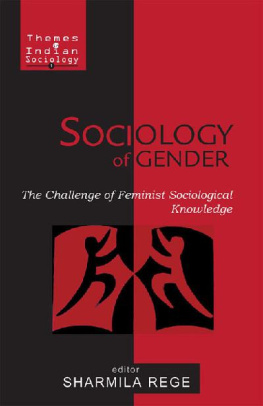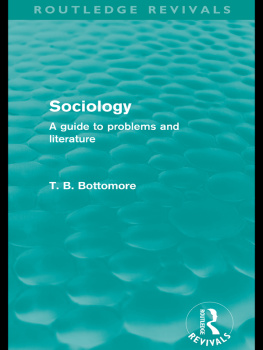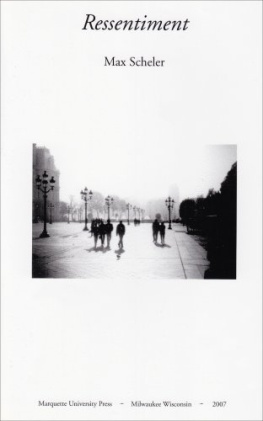Scheler Max - Problems of a Sociology of Knowledge
Here you can read online Scheler Max - Problems of a Sociology of Knowledge full text of the book (entire story) in english for free. Download pdf and epub, get meaning, cover and reviews about this ebook. City: Abingdon, year: 2013, publisher: Routledge, genre: Religion. Description of the work, (preface) as well as reviews are available. Best literature library LitArk.com created for fans of good reading and offers a wide selection of genres:
Romance novel
Science fiction
Adventure
Detective
Science
History
Home and family
Prose
Art
Politics
Computer
Non-fiction
Religion
Business
Children
Humor
Choose a favorite category and find really read worthwhile books. Enjoy immersion in the world of imagination, feel the emotions of the characters or learn something new for yourself, make an fascinating discovery.
- Book:Problems of a Sociology of Knowledge
- Author:
- Publisher:Routledge
- Genre:
- Year:2013
- City:Abingdon
- Rating:3 / 5
- Favourites:Add to favourites
- Your mark:
- 60
- 1
- 2
- 3
- 4
- 5
Problems of a Sociology of Knowledge: summary, description and annotation
We offer to read an annotation, description, summary or preface (depends on what the author of the book "Problems of a Sociology of Knowledge" wrote himself). If you haven't found the necessary information about the book — write in the comments, we will try to find it.
Problems of a Sociology of Knowledge — read online for free the complete book (whole text) full work
Below is the text of the book, divided by pages. System saving the place of the last page read, allows you to conveniently read the book "Problems of a Sociology of Knowledge" online for free, without having to search again every time where you left off. Put a bookmark, and you can go to the page where you finished reading at any time.
Font size:
Interval:
Bookmark:
First Published in 1980, Manfred S. Frings translation of Problems of a Sociology of Knowledge makes available Max Schelers important work in sociological theory to the English-speaking world. The book presents the thinkers views on mans condition in the twentieth-century and places it in a broader context of human history.
This book highlights Scheler as a visionary thinker of great intellectual strength who defied the pessimism that many of his peers could not avoid. He comments on the isolated, fragmented nature of mans existence in society in the twentieth century but suggests that a World- Age of Adjustment is on the brink of existence. Scheler argues that the approaching era is a time for the disjointed society of the twentiethcentury to heal its fractures and a time for different forms of human knowledge to come together in global understanding.
This translation first published in 1980
by Routledge & Kegan Paul Ltd
This edition first published in 2013 by Routledge
2 Park Square, Milton Park, Abingdon, Oxon, OX14 4RN
Simultaneously published in the USA and Canada
by Routledge
711 Third Avenue, New York, NY 10017
Routledge is an imprint of the Taylor & Francis Group, an informa business
This translation 1980 Routledge & Kegan Paul Ltd
All rights reserved. No part of this book may be reprinted or reproduced or utilised in any form or by any electronic, mechanical, or other means, now known or hereafter invented, including photocopying and recording, or in any information storage or retrieval system, without permission in writing from the publishers.
Publishers Note
The publisher has gone to great lengths to ensure the quality of this reprint but points out that some imperfections in the original copies may be apparent.
Disclaimer
The publisher has made every effort to trace copyright holders and welcomes correspondence from those they have been unable to contact.
A Library of Congress record exists under ISBN: 80475743
ISBN: 978-0-415-62334-6 (hbk)
ISBN: 978-0-203-10093-6 (ebk)
This translation first published in 1980
by Routledge & Kegan Paul Ltd
39 Store Street, London WCIE 7DD,
9 Park Street, Boston, Mass. 02108, USA and
Broadway House, Newtown Road
Henley-on-Thames, Oxon RG9 1 EN
Set in Monophoto Times New Roman
and printed in Great Britain by
Thomson Litho Ltd, East Kilbride, Scotland
Translated from the German edition published by
Francke Verlag, Bern 1960
Copyright Introduction Kenneth W. Stikkers 1980
This translation Routledge & Kegan Paul 1980
No part of this book may be reproduced in
any form without permission from the
publisher, except for the quotation of brief
passages in criticism
British Library Cataloguing in Publication Data
Scheler, Max
Problems of a sociology of knowledge.
(International library of sociology).
1. Knowledge, Sociology of
I. Title II. Series
301.21BD175
ISBN 0 7100 0302 1
Max Schelers Probleme einer Soziologie des Wissens originally appeared as the introductory essay to the anthology Versuche zu einer Soziologie des Wissens, which he edited (Munich: Duncker & Humblot, 1924), pp. 1146. The work later appeared, slightly changed and expanded, as part of Schelers Die Wissensformen und die Gesellschaft (Leipzig: Der Neue Geist Verlag, 1926), pp. 1229. The present translation of this text is taken from the 2nd edition of the Wissensformen und die Gesellschaft, edited by Maria Scheler, volume 8 of Schelers Gesammelte Werke (Bern: A. Francke Verlag, 1960), pp. 16190. Corrections made for the forthcoming 3rd edition of the Wissensformen und die Gesellschaft have been included in this translation.
Throughout the text the German term Geist has been rendered as mind, except for particular instances where it had to be translated by spirit. The primary context of Schelers use of mind is in speaking of the group-mind. By contrast spirit is used in connection with Drang (vital urge), i.e. in a metaphysical, not sociological, context.
| DePaui University | M.S.F. |
| Chicago | |
| November 1978 |
In every historical age a certain set of concerns and problems are experienced more deeply than others by those living in that age and lie most closely to its vital center, nagging at its heart, trying its peoples souls, and hindering, to a greater or lesser degree, its life flow. These concerns are those that express themselves again and again through the intellectuals of the age the artists, writers, and philosophers as well as in the thinking of the masses.
For Western civilization in the twentieth century particularly profound has been the experience of social fragmentation and isolation. Social scientists, for example, have described our modern society as a lonely crowd, noting that ironically as people have been increasingly enmassed into cities and have become geographically closer together, the psychic bonds that hold people together in communal solidarity in families, neighborhoods, nations, etc. have steadily dissolved.peculiarly, the family, long viewed in traditional communities as the positive core of ones identity, is today seen, especially by psychology, as the primary source of prejudices, deceptions, and neuroses of all sorts, as something to be gotten away from. (Indeed, one is almost led to believe that we would all have happy, healthy personalities if only we had no parents!) All these things, so familiar to us, are indicative of the prevalent experience of social fragmentation and isolation.
And if meaning, in general, resides in ones felt connection with something greater than ones self, a larger whole, a more feeling part of a context, be it social, religious, or whatever then this social fragmentation must be seen as coincidental with a breakdown of experienced life context and a loss of meaning, i.e. with the rise of nihilism. Indeed, just as every age has had for itself an image of man, a representation of what it means to be human .eg. the Greek hero, the rational man of the Enlightenment the image we have of man in our age seems to resemble a cubist painting viz. fragmented, distorted, confused or, more frighteningly, the figure in Eduard Munchs The Scream: throughout the literature and art of the twentieth century man is portrayed as a being who is internally screaming, screaming so violently that the entire world seems to vibrate and yet, strangely enough, no one seems to hear, certainly no god. And such artistic portrayals of modern man are confirmed by the social scientists: according to every stress indicator known heart attacks, suicides, alcoholism, violent crimes, drug usage, etc. the concrete, experienced quality of life not the abstract quality of life measured by gross national product and per capita income statistics has steadily declined as the modern technological age has progressed, despite generally increasing affluence. Never before has the ancient dictum Know thyself seemed so impossible. Twentieth-century man, unlike those before him, really does not know who he is or what his place is in the order of the cosmos: he is a being in search of his own meaning.
It was to such an age, in which the human context of things is experienced as hopelessly fragmented and the search for meaning reaches desperation, that the German philosopher Max Scheler (18741928) spoke. He, like Oswald Spengler, for a whole generation of thinkers Max Scheler was a beacon of light which pierced the darkness of nihilism.
Font size:
Interval:
Bookmark:
Similar books «Problems of a Sociology of Knowledge»
Look at similar books to Problems of a Sociology of Knowledge. We have selected literature similar in name and meaning in the hope of providing readers with more options to find new, interesting, not yet read works.
Discussion, reviews of the book Problems of a Sociology of Knowledge and just readers' own opinions. Leave your comments, write what you think about the work, its meaning or the main characters. Specify what exactly you liked and what you didn't like, and why you think so.








